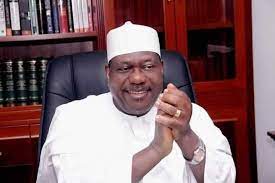All Progressives Congress members of the House of Representatives yesterday made good their threat to block the 2014 Appropriation Bill as directed by the leadership of the party as they prevented the budget from going to second reading.
The APC lawmakers, who appeared to have strategised ahead of yesterday’s plenary session, did not allow anybody to second the motion to allow the budget to be read the second time which was moved by the House Majority Leader, Mulikat Akande, before a member of the party raised a point of order.
Raising the order, Emmanuel Jime (Benue, APC) directed the attention of the House to what he described as a fundamental breach of the budget presented by the Minister of Finance to Section 21 (1,2,3) of the Fiscal Responsibility Act.
According to him, the corporations and agencies listed in the section, including the Nigerian National Petroleum Corporation and the Central Bank of Nigeria, ought to have submitted revenue estimates to the Minister of Finance, who would in turn cause same to be submitted to the parliament as an attachment of the budget.
He said: “That is the key requirement. What is here is an abridged summary and not all members have a copy of it. What we have is just summary prepared by the minister herself and not the detailed estimates submitted to the minister.
“The danger is that the National Assembly has not been able to oversight NNPC. If the minister has been able to submit the estimates to us, this House would have known where the missing $8 billion is.
“When a law is passed, we must not allow it to be breached. The budget presentation has breached our law. We must not satisfy the convenience of the moment for posterity.”
In an effort to downplay the argument, the Chairman House Committee on Appropriation, John Eno, made spirited efforts to justify why the House should proceed with the consideration of the budget, insisting that the budget presentation has not breached the Fiscal responsibility Act.
According to him, for many years after the passage of the Act, the National Assembly had passed budgets without the estimates accompanying them. But we kept on insisting that there were some corporations whose budget ought to be laid.”
He submitted that in the case of the 2014 budget, the summary of the estimates accompanied it, adding that it was one thing for the Executive to comply with the law and another thing for the National Assembly to know what to do with the estimates.
“There is no time anybody has raised issues with the budget of these corporations. The Standing Committees of the House supervising these agencies should be allowed to raise questions concerning the estimates when the budget is referred to them.
“The point of order is not enough to stop the consideration of the budget. The budget is the most important document for the parliament”.
Ruling on the issue, House Speaker Waziri Tambuwal noted that once a point of order was raised, it ought not to be debated, adding that because of the sensitive nature of the issue and to get information, he had allowed the Chairman, House Committee on Appropriation, to make a comment.
“The issue raised by Hon. Jime is a point of law but the chairman Appropriation said that the condition has been met. The chair will stand down this debate and allow the following people to advise the chair on how to proceed”.
The speaker, therefore, nominated a six-man ad hoc committee, including the Chairman, House Committee on Rules and Business, Sani Tsoka, his deputy, Sunday Adepoju; Chairman, House Committee on Judiciary, Aminu Shehu Sagari, his deputy, Ken Chikore; and Chairman, Committee on Justice, Ali Ahmed, and his deputy, Chukwuemeka Nwaogwu, to advise him on the way forward within 24 hours.
Blueprint gives you the latest Nigerian news in one place. Read the news behind the news on burning National issues, Kannywood, Videos and the Military



